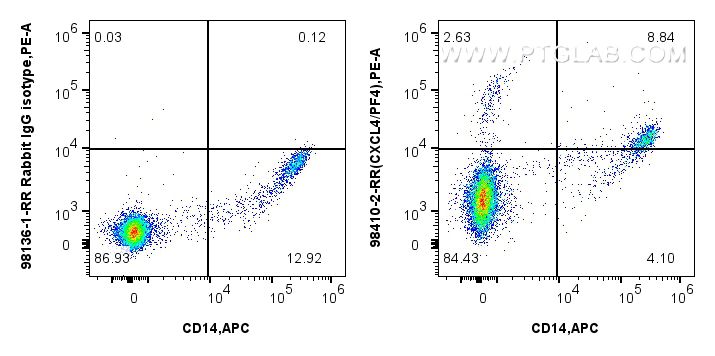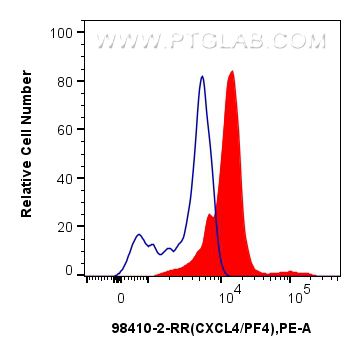验证数据展示
产品信息
98410-2-PBS targets CXCL4/PF4 in FC (Intra) applications and shows reactivity with human samples.
| 经测试应用 | FC (Intra) Application Description |
| 经测试反应性 | human |
| 免疫原 |
CatNo: Eg2129 Product name: Recombinant Human CXCL4/PF4 protein (rFc Tag) Source: mammalian cells-derived, pHZ-KIsec-C-rFc Tag: C-rFc Domain: 32-101 aa of NM_002619.4 Sequence: EAEEDGDLQCLCVKTTSQVRPRHITSLEVIKAGPHCPTAQLIATLKNGRKICLDLQAPLYKKIIKKLLES 种属同源性预测 |
| 宿主/亚型 | Rabbit / IgG |
| 抗体类别 | Recombinant |
| 产品类型 | Antibody |
| 全称 | platelet factor 4 |
| 别名 | CXCL4, PF4, SCYB4, C X C motif chemokine 4, C-X-C motif chemokine 4 |
| 计算分子量 | 11 kDa |
| GenBank蛋白编号 | NM_002619.4 |
| 基因名称 | PF4 |
| Gene ID (NCBI) | 5196 |
| 偶联类型 | Unconjugated |
| 形式 | Liquid |
| 纯化方式 | Protein A purification |
| UNIPROT ID | P02776 |
| 储存缓冲液 | PBS only, pH 7.3. |
| 储存条件 | Store at -80°C. The product is shipped with ice packs. Upon receipt, store it immediately at -80°C |
背景介绍
CXCL4, also known as platelet factor 4 (PF-4), is the oldest member of the chemokine family. CXCL4 is a chemokine produced by activated platelets and immune cells involved in pathological conditions such as cancer, infections and inflammatory diseases like systemic sclerosis (SSc), rheumatoid arthritis (RA) and psoriatic arthritis (PsA), among others. CXCL4 is present in the α-granules of platelets in amounts that constitute up to 2% platelet protein mass. CXCL4 plays a determinant role in distinct physiological processes such as in hematopoiesis, angiogenesis, coagulation and modulation of immune responses. For instance, CXCL4 can prevent monocyte apoptosis and promote cell survival, induces the production of TNF and reactive oxygen species (ROS) and promotes monocyte differentiation into a unique macrophage-like phenotype.



